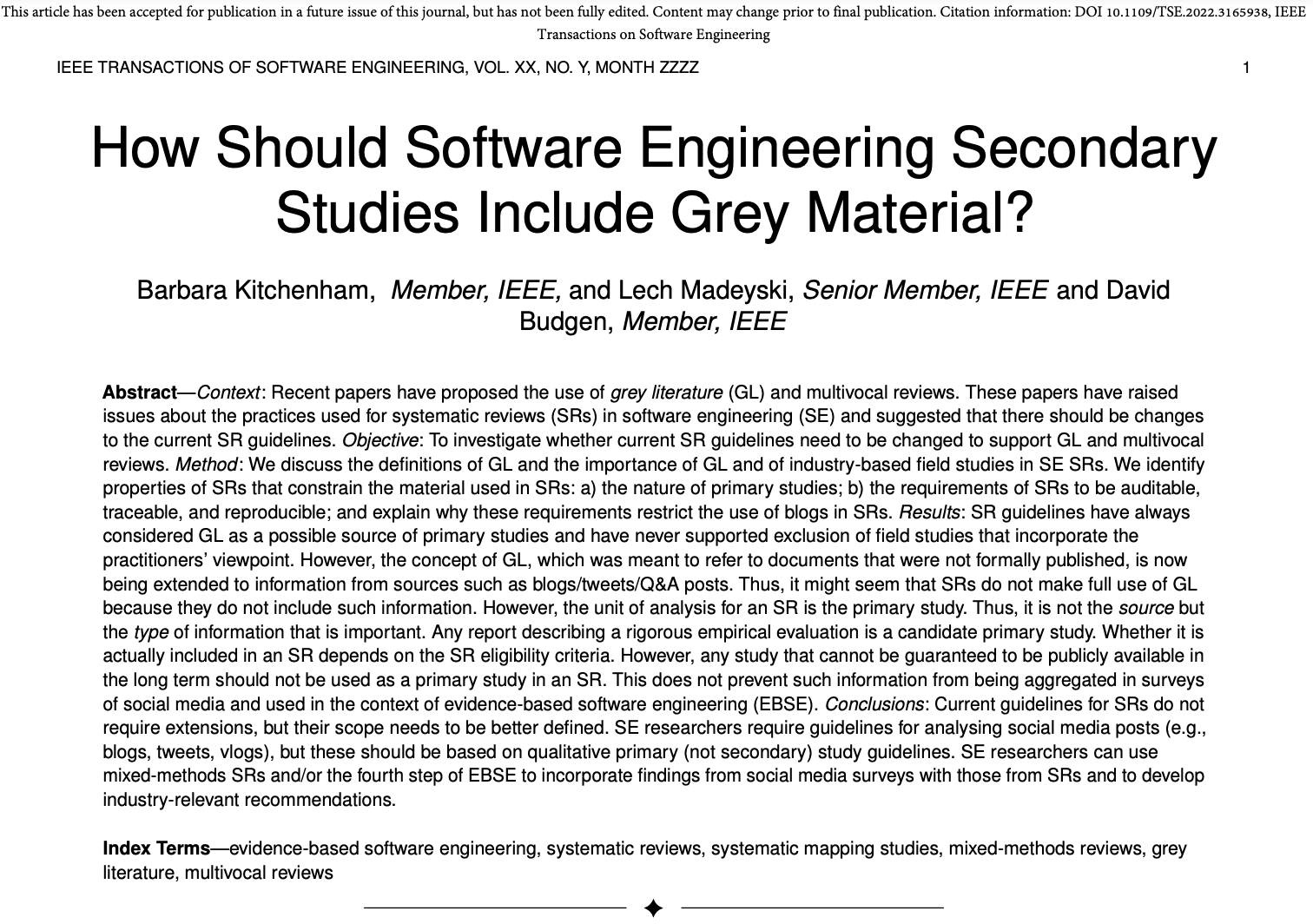Please find my presentation of the Software Engineering track that I lead on the MSc level – sorry, it is mainly in Polish!
Please find my presentation of the Software Engineering track that I lead on the MSc level – sorry, it is mainly in Polish!
I’m more than happy to share that the 2024 edition of the TOP 2% ranking of researchers by Prof. John P.A. Ioannidis from Stanford University was just published by Elsevier [1], and I’m on Stanford’s Top 2% Scientists list once again.
[1] https://elsevier.digitalcommonsdata.com/datasets/btchxktzyw/7
See also [2, 3]
[2] https://pwr.edu.pl/uczelnia/aktualnosci/rekordowe-76-osob-z-pwr-w-rankingu-top-2-13449.html
[3] https://wit.pwr.edu.pl/aktualnosci/naukowcy-z-wit-na-liscie-top-2-333.html
It is an honor to be in the top 2% of the most influential researchers in the world in all scientific disciplines once again. For more details, see “October 2023 data-update for “Updated science-wide author databases of standardized citation indicators” by John P.A. Ioannidis from Stanford University published by Elsevier [1].
48 researchers from my university are on the list [2], including a few colleagues from my faculty [3].
[1] Ioannidis, John P.A. (2022), “September 2022 data-update for “Updated science-wide author databases of standardized citation indicators””, Mendeley Data, V4, DOI: 10.17632/btchxktzyw.6
See also older ranking https://madeyski.e-informatyka.pl/in-the-top-2-of-researchers-once-again/
It is an honor to be in the top 2% of the most influential researchers in the world in all scientific disciplines once again. For more details, see “September 2022 data-update for “Updated science-wide author databases of standardized citation indicators” by John P.A. Ioannidis from Stanford University published by Elsevier [1].
Over 40 researchers from my university are on the list [2] including a few colleagues from my faculty [3].
[1] Ioannidis, John P.A. (2022), “September 2022 data-update for “Updated science-wide author databases of standardized citation indicators””, Mendeley Data, V4, DOI: 10.17632/btchxktzyw.4
[2] https://pwr.edu.pl/uczelnia/aktualnosci/blisko-50-naukowcow-pwr-wysoko-w-rankingu-top-2-12646.html
[3] https://wit.pwr.edu.pl/aktualnosci/naukowcy-wit-wysoko-w-rankingu-top-2-101.html
Awesome news once again! Happy to have my 4th IEEE TSE paper (TSE is #1 journal in Software Engineering).
Article “SEGRESS: Software Engineering Guidelines for REporting Secondary Studies” by Barbara Kitchenham, Lech Madeyski, and David Budgen has been accepted by IEEE Transactions on Software Engineering. Preprint: https://doi.org/10.1109/TSE.2022.3174092. Twitter: https://twitter.com/LechMadeyski/status/1524697213641060353
Abstract:
Context: Several tertiary studies have criticized the reporting of software engineering secondary studies.
Objective: Our objective is to identify guidelines for reporting software engineering (SE) secondary studies which would address problems observed in the reporting of software engineering systematic reviews (SRs).
Method: We review the criticisms of SE secondary studies and identify the major areas of concern. We assess the PRISMA 2020 (Preferred Reporting Items for Systematic Reviews and Meta-Analyses) statement as a possible solution to the need for SR reporting guidelines, based on its status as the reporting guideline recommended by the Cochrane Collaboration whose SR guidelines were a major input to the guidelines developed for SE. We report its advantages and limitations in the context of SE secondary studies. We also assess reporting guidelines for mapping studies and qualitative reviews, and compare their structure and content with that of PRISMA 2020.
Results: Previous tertiary studies confirm that reports of secondary studies are of variable quality. However, \emph{ad hoc} recommendations that amend reporting standards may result in unnecessary duplication of text. We confirm that the PRISMA 2020 statement addresses SE reporting problems, but is mainly oriented to quantitative reviews, mixed-methods reviews and meta-analyses. However, we show that the PRISMA 2020 item definitions can be extended to cover the information needed to report mapping studies and qualitative reviews.
Conclusions: In this paper and its Supplementary Material, we present and illustrate an integrated set of guidelines called SEGRESS (Software Engineering Guidelines for REporting Secondary Studies), suitable for quantitative systematic reviews (building upon PRISMA 2020), mapping studies (PRISMA-ScR), and qualitative reviews (ENTREQ and RAMESES), that addresses reporting problems found in current SE SRs.
The accepted version of SEGRESS Guidelines: https://madeyski.e-informatyka.pl/download/KitchenhamMadeyskiBudgen22TSE-SEGRESS.pdf
Supplementary Material: https://madeyski.e-informatyka.pl/download/SEGRESS22supplement.pdf

Kitchenham, Barbara Ann, Madeyski, Lech, and Budgen, David. SEGRESS: Software Engineering Guidelines for REporting Secondary Studies. IEEE Transactions on Software Engineering, DOI: 10.1109/TSE.2022.3174092
Teaser:
Awesome news! Article “How should software engineering secondary studies include grey material?” by Barbara Kitchenham, Lech Madeyski, David Budgen has been accepted by IEEE Transactions on Software Engineering. Preprint: https://doi.org/10.1109/TSE.2022.3165938. Twitter: https://twitter.com/LechMadeyski/status/1512804644128501763
Happy to have my 3rd IEEE TSE paper (TSE is #1 journal in Software Engineering).
Abstract:
It is an honour to be in the top 2% of the most influential researchers in the world in all scientific disciplines in 2021. The list by Jeroen Baas (Elsevier), Kevin Boyack (SciTech Strategies) and John P.A. Ioannidis (Stanford University) includes almost 190,000 scientists and was published by Elsevier [1].
Over 40 researchers from my university are on the list [2,3]:
On a basis of the most recent data from 2020:
[1] Baas, Jeroen; Boyack, Kevin; Ioannidis, John P.A. (2021), “August 2021 data-update for “Updated science-wide author databases of standardized citation indicators””, Mendeley Data, V3, doi: 10.17632/btchxktzyw.3
[2] https://pwr.edu.pl/uczelnia/aktualnosci/ponad-40-naukowcow-pwr-wysoko-w-rankingu-top-2-12213.html
Happy to share link https://doi.org/10.1109/TSE.2021.3070480 to my just accepted, recent joint IEEE TSE paper “The Importance of the Correlation in Crossover Experiments” with Barbara Kitchenham, Giuseppe Scanniello and Carmine Gravino
Happy to share a result of joint work with Prof. Barbara Kitchenham and my PhD student Tomasz Lewowski:
Lech Madeyski, Tomasz Lewowski, and Barbara Kitchenham, “OECD Recommendation’s Draft Concerning Access to Research Data from Public Funding: A Review”, Bulletin of the Polish Academy of Sciences: Technical Sciences, vol. 69, no. 1, p. e135401, 2021. DOI: 10.24425/bpasts.2020.135401 Draft of the accepted paper: https://madeyski.e-informatyka.pl/download/MadeyskiLewowskiKitchenham21BPASTS.pdf
Reviewing papers for the most influential international journal for Empirical Software Engineering (ESE) research may help to strengthen the ESE community around the journal, but can also be rewarding.
Empirical Software Engineering Reviewer Certificate of Recognition